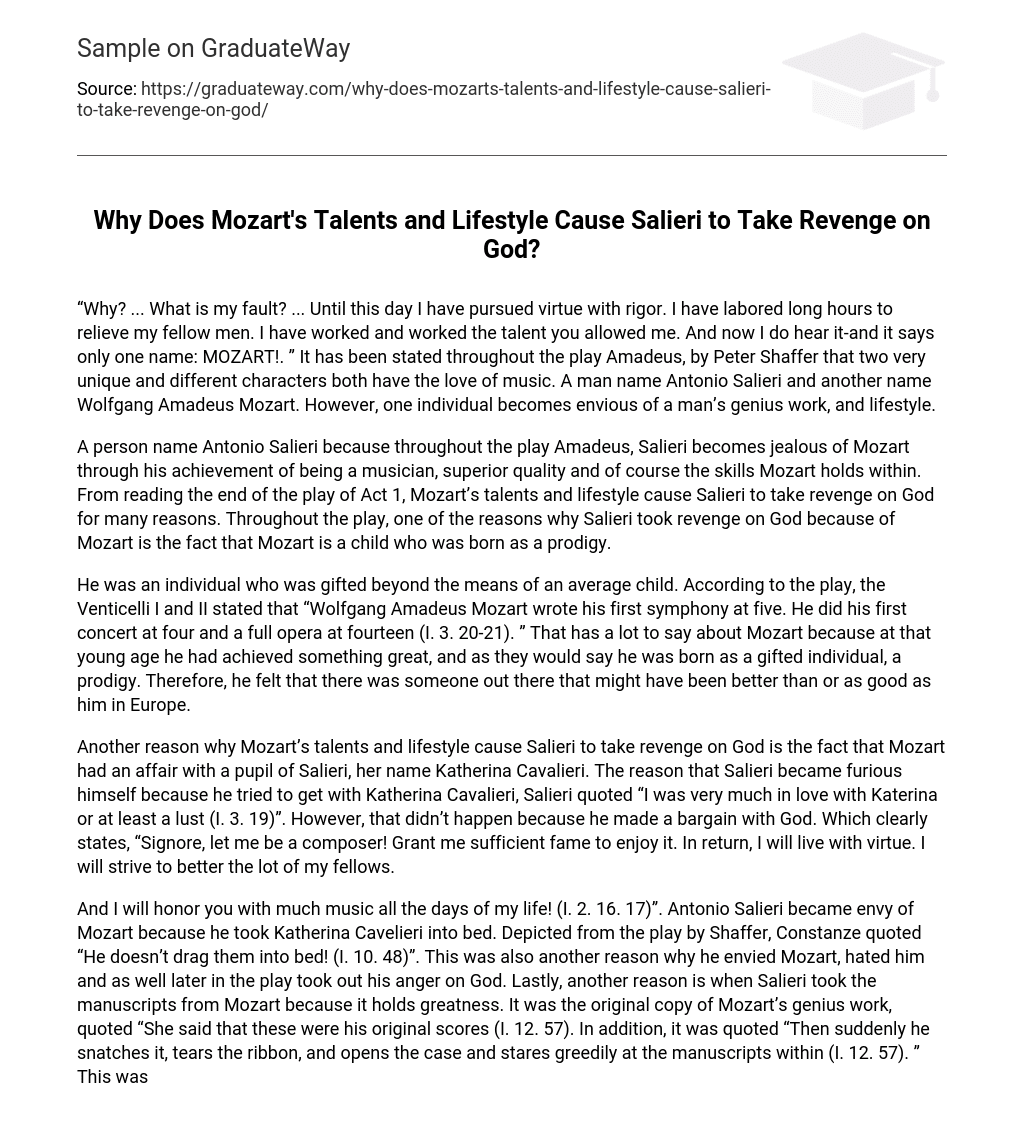“Why? … What is my fault? … Until this day I have pursued virtue with rigor. I have labored long hours to relieve my fellow men. I have worked and worked the talent you allowed me. And now I do hear it – and it says only one name: MOZART!”.
Throughout the play “Amadeus” by Peter Shaffer, it is emphasized that two characters, Antonio Salieri and Wolfgang Amadeus Mozart, possess a deep love for music. Yet, one of them becomes envious of Mozart’s exceptional talent and way of life.
A person named Antonio Salieri becomes jealous of Mozart’s achievements as a musician, his superior quality, and his impressive skills throughout the play “Amadeus.” In Act 1 of the play, Salieri is driven to seek revenge on God due to Mozart’s talents and lifestyle. One of the reasons for Salieri’s vengeance is the fact that Mozart was born as a prodigious child.
According to the Venticelli I and II in the play, Wolfgang Amadeus Mozart displayed extraordinary talent from a young age. They reported that he composed his first symphony at the age of five, performed his first concert at four, and created a full opera at fourteen (I. 3. 20-21). These accomplishments showcase Mozart’s exceptional abilities and classify him as a prodigious individual. Despite his talent, he believed that there might be someone in Europe who was superior or equal to him.
Salieri seeks revenge on God due to several factors, one being Mozart’s affair with a student of Salieri named Katherina Cavalieri. This infuriates Salieri even further because he himself had feelings for Katherina. He confesses, “I was very much in love with Katerina or at least a lust” (I. 3. 19). Despite his desires, Salieri had made a deal with God, asking to become a renowned composer and promising to live virtuously and help others. Despite this agreement, Mozart’s talents and lifestyle still lead Salieri to seek revenge on God.
Antonio Salieri became envious of Mozart because he had a sexual relationship with Katherina Cavelieri. This was also a reason why Salieri hated Mozart and later expressed his anger towards God. Another reason for Salieri’s envy was when he took Mozart’s manuscripts, which were the original scores of his genius work. This act symbolized the greatness that Salieri desired but felt incapable of achieving himself. In contrast to Mozart’s effortless talent, Salieri struggled for hours and days to complete his own compositions, which could never compare to Mozart’s pure genius. Ultimately, the opening quote of the play expresses Salieri’s intense hatred for Mozart, accusing him of being spiteful, conceited, and lazy.The preceding paragraphs provided examples of Salieri’s envy and hatred towards Mozart, as well as his resentment towards God for betraying him by not intervening to prevent Mozart from making his life more frustrating. Salieri had made a deal with God and fulfilled his end of the bargain, yet God allowed Mozart to thrive. Thus, Salieri implied that he engaged in a battle with God through Mozart, whom he referred to as God’s favored creature, named Amadeus. Salieri believed that this creature needed to be destroyed. (I. 12.60)





